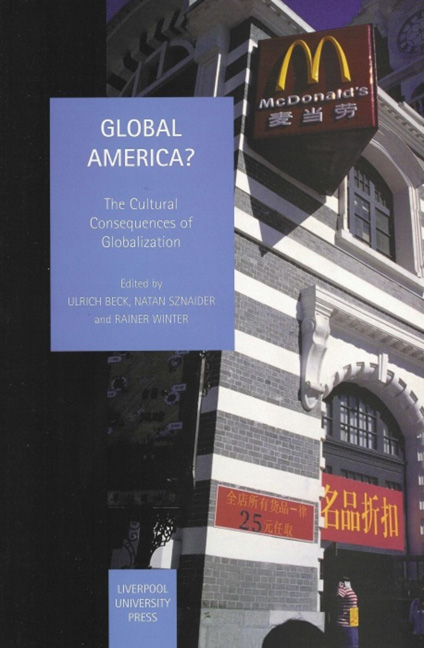Book contents
- Frontmatter
- Contents
- List of Contributors
- Acknowledgments
- Introduction
- PART I THEORETICAL PERSPECTIVES
- 1 Rooted Cosmopolitanism: Emerging from a Rivalry of Distinctions
- 2 Assessing McDonaldization, Americanization and Globalization
- 3 Culture, Modernity and Immediacy
- PART II NATIONAL CASE STUDIES
- PART III TRANSNATIONAL PROCESSES
- PART IV EPILOGUE
- Rethinking Americanization
2 - Assessing McDonaldization, Americanization and Globalization
from PART I - THEORETICAL PERSPECTIVES
- Frontmatter
- Contents
- List of Contributors
- Acknowledgments
- Introduction
- PART I THEORETICAL PERSPECTIVES
- 1 Rooted Cosmopolitanism: Emerging from a Rivalry of Distinctions
- 2 Assessing McDonaldization, Americanization and Globalization
- 3 Culture, Modernity and Immediacy
- PART II NATIONAL CASE STUDIES
- PART III TRANSNATIONAL PROCESSES
- PART IV EPILOGUE
- Rethinking Americanization
Summary
The Globalization Debate
New or changing cultural phenomena ignite competition among traditions of social theory. These contests often result in a plurality of descriptions of the defining characteristics of the contemporary scene. Most recently, contending perspectives on the globalization debate have emerged and seem unresolvable. The macro-phenomenology of globalization has had tremendous contemporary resonance. Globalization is a fully fledged buzzword, referring, as often as not, to the blending of cultures in the global marketplace and in the transnational media. The idea of McDonaldization has also had a profound cultural resonance. Students, activists and the general public (not to mention social thinkers: see Smart 1999; Alfino et al. 1998) have found the idea of McDonaldization useful for describing everything from religion (Drane 2000) to the university (Parker and Jary 1995) to museums (Kirchberg 2000). Finally, the idea of Americanization has mobilized debate and resistance in Europe, Asia and South America (Kuisel 1993). In this essay, we discuss the relationships among these three perspectives and analyse the degree to which they can be integrated.
The ideas of McDonaldization and Americanization are at odds, to some degree, with the characterizations of globalization that have the greatest cachet today. There is a gulf between those who see the consequence of global capitalism as an increasingly Americanized and/or rationalized world and those who prefer a characterization of contemporary society as pluralistic and indeterminate, in which rationalization and American culture are only two trends among many. At the risk of being reductive, this divide amounts to a difference between a vision of a world that is becoming increasingly American, rationalized, codified and restricted and a vision of the world as ever more diverse, effervescent and free.
The three concepts are rooted in competing visions of modernity. Specifically, McDonaldization is reminiscent of a top-down, ‘iron cage’ version of modern social theory. With roots in the Weberian tradition, it asserts the progressive sway of rationalized structural constraints over agents, especially in the sphere of consumption. Americanization is cousin to a neo-Marxian conception of economic imperialism and cultural hegemony. This perspective asserts that America's aggressive exporting of media and commodities amounts to a crypto-imperialist attack on national sovereignties. Finally, most of globalization theory embraces the postmodern emphasis on diversity, hybridity, velocity and agency.
- Type
- Chapter
- Information
- Global America?The Cultural Consequences of Globalization, pp. 30 - 48Publisher: Liverpool University PressPrint publication year: 2003



